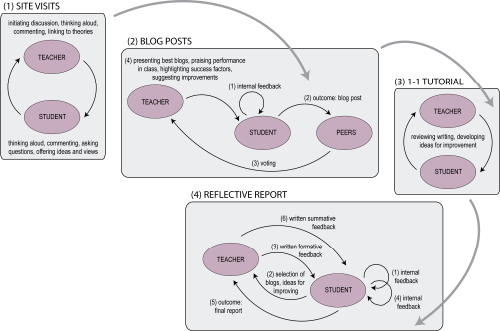Research-based blogging: developing students' skills
Dr Kerstin Sailer (UCL Bartlett School of Architecture) discusses how her students have benefitted from hands-on teaching and learning by visiting specific buildings and writing a weekly blog.
23 June 2015
"I am a Lecturer in Complex Buildings at the Space Syntax Laboratory, Bartlett School of Architecture, where I investigate the impact of spatial design on people and social behaviours inside a range of buildings such as offices, laboratories, hospitals and schools.
I lead the module ‘Buildings Organisations Networks’ (BON) in the MSc Spatial Design: Architecture and Cities (SDAC), which attracts postgraduate students from a variety of countries, backgrounds and disciplines each year, most of which have a first degree in architecture or planning and have worked in practice for a few years.
The biggest challenge for our students is to become researchers, who read, write, apply theory to real life cases and critically reflect on the impact of the built environment. To address this challenge I have devised an innovative approach combining visits to specific buildings in London with a weekly blogging exercise. This enables students to observe phenomena first hand, develop their writing skills, and become active learners, who make connections to the world through the use of social media."
What do you enjoy most about teaching UCL students? How have students responded to your teaching methods?
I feel very privileged to teach such a bright lot of students from all over the world. Learning from them is fascinating – for instance in one of my lectures on school buildings I ask the students to make a quick sketch of the secondary school they attended. Then we come together and introduce each other to the different ways in which teaching and learning can be organised spatially in different places around the world and how this has an impact on culture, achievements and the way we see the world.
With the blogging, the students are often sceptical in the beginning. For some it feels very daunting to produce a text on a weekly basis, which is then not only read by me but also their peers and potentially the public. I know this is a big ask, but once they get the hang of it, I get a lot of positive feedback. Asked about the single best thing about the module, students commented: “The weekly blogging exercise. It forces you to quickly assimilate the knowledge and apply it”, “The site visits and (…) especially listening to what the other students thought of the sites, and how they could connect it both to past practice as architects or planners, but also their way of seeing the connection between theory and the site we visited”.

Do you have any advice for UCL colleagues who are unsure about trying a different approach to teaching? What support (colleagues, faculty, departmental, central, external) did you utilise?
I would advise colleagues to be experimental and just go for it step by step. The method I’m now using has been created over the course of 4 years and I am still fine-tuning and improving it every year. You will find out what works and doesn’t work for your own setting and context, and I have experienced that students are actually quite excited to try something new and are keen to give feedback how it has worked for them.
I have used a lot of different resources: I have discussed my ideas with colleagues, I have asked former students, I have read about pedagogical theories and approaches and utilised expertise from the IOE during studying for a Postgraduate Certificate in Teaching and Learning in Higher and Professional Education. I have also found helpful resources on Twitter, for instance from a professor in the US, who uses social media. But then at some point I believe you just have to do it and try it out yourself.
What does your Provost's Teaching Award recognition mean to you? How might it affect your approach to teaching in the future?
It is an honour to be recognised for contributing to innovation in learning and teaching at UCL. I feel it balances the common perception that UCL is all about research, which is not the case. We love research and we do it very well, but we also love passing our knowledge on. Seeing the sparkle in a student’s eye when it suddenly clicks and they’ve understood something, or seeing them grow from week to week and produce intelligent and reflective essays is a wonderful moment. I also learn a lot from my students and hearing their questions often makes me think again.
I’m very proud of my students and would like to thank them for everything they bring to the course and to UCL as a community.
 Close
Close

